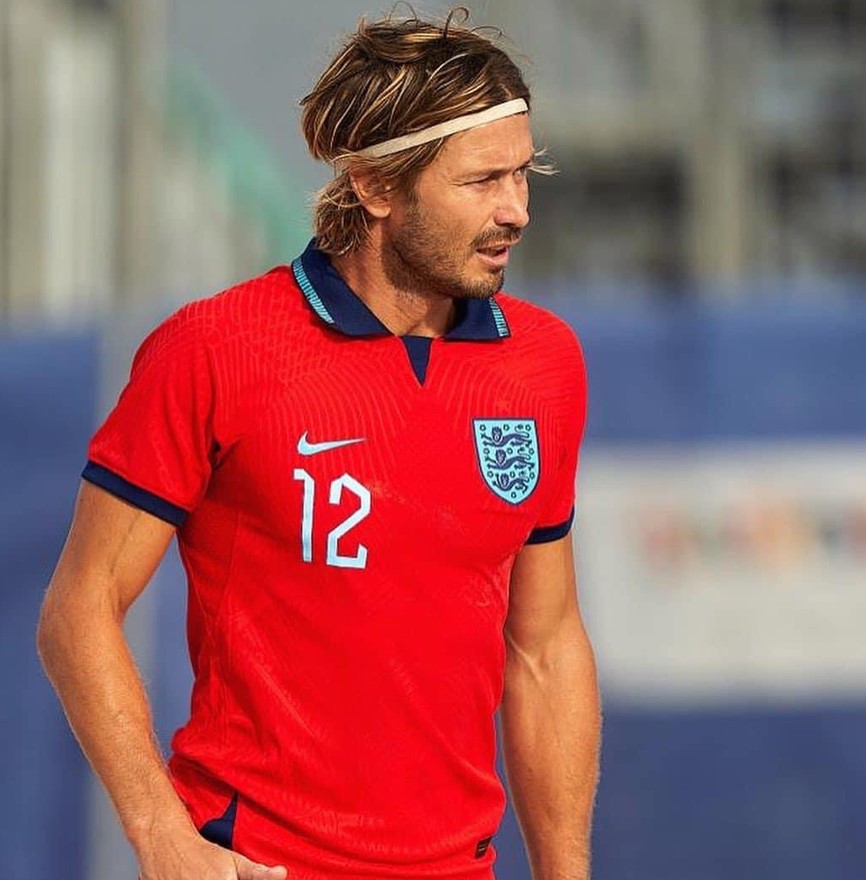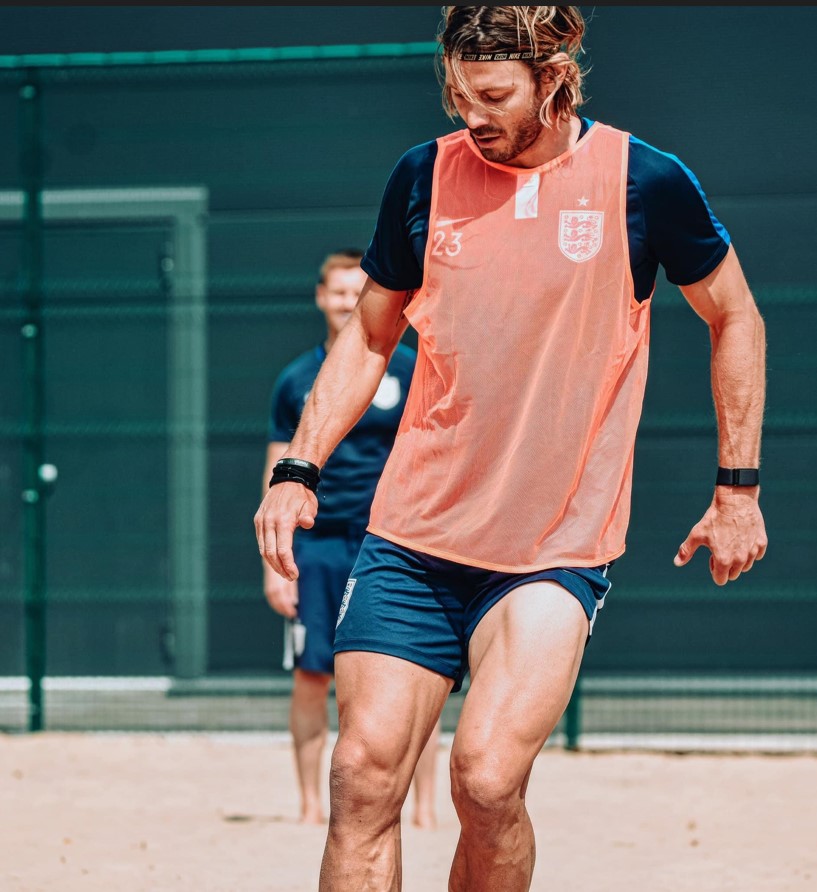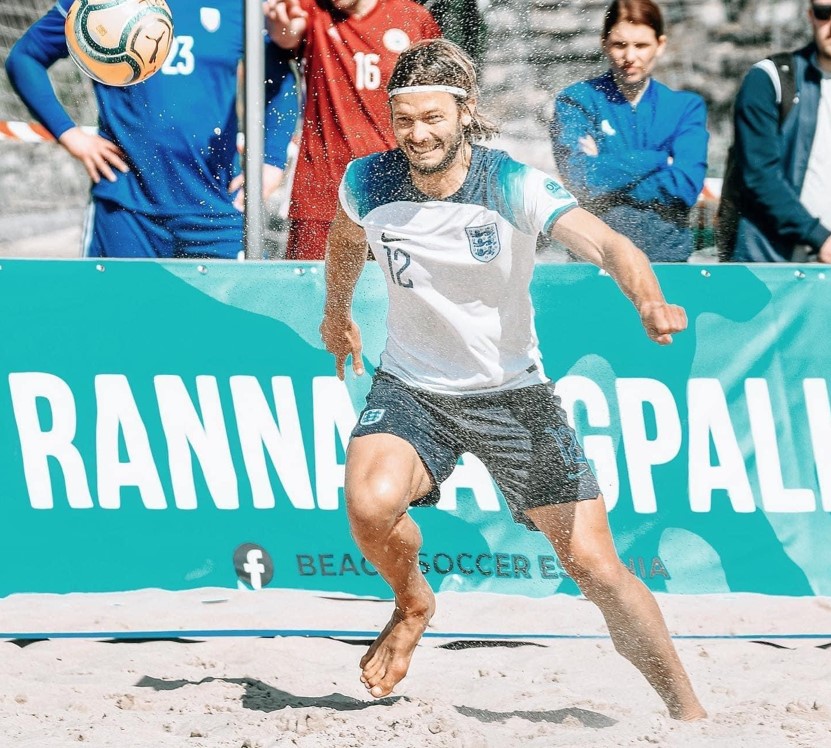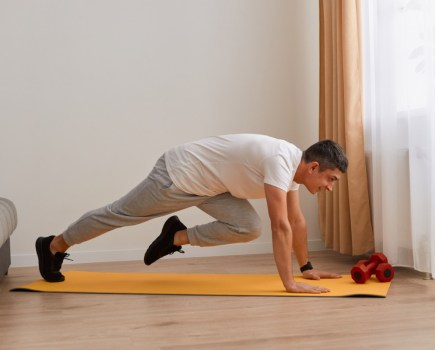England beach footballer James Temple is training hard for the World Cup qualifiers later this month and for a major tournament in Neom, Saudi Arabia, in November. Growing up on the Isle of Wight, where the UK’s main beach football league started, 40-year-old James, from West Sussex, switched from semi-pro grass football to beach football at 19. Now, with nearly 150 international caps, James takes a moment to tell Men’s Fitness all about the differences between grass and beach football, and the unique challenges of balancing his sporting career with work as a personal trainer.
Men’s Fitness: You’ve played both grass and beach football. What are the differences between the two sports?
James Temple: Balance is a big issue because we play on soft sand, so stability is tricky. There’s also a huge conditioning difference – pushing off and accelerating in soft sand is like running in porridge! The ball spends more time in the air, which makes for a very acrobatic, high-paced game with lots of volleys and overhead kicks. It’s quite a spectacle for fans.



MF: Is it a five-a-side format?
JT: Yes, it’s five-a-side with rolling substitutions. You tend to play for 3 to 6 minutes before needing a breather, and the game is split into three periods of 12 minutes. It’s very fast-paced, almost like basketball with its tactical fluidity. The pitch is slightly bigger than a five-a-side grass pitch, so it’s intricate and full of action.
MF: How do you balance beach football with your day job?
JT: I’m lucky – I’m a personal trainer, so I’m always in and around gyms. We train every Sunday most of the year, and we’re expected to do individual or small group work during the week. Most of us live close to some form of sand, so we can train locally too.
Training for beach football
MF: What kind of training do you do to sharpen match fitness for beach football?
JT: We have a strength and conditioning coach, Felipe Lira, who gives us all guidance and I’ll do a lot of work on my upper body strength too. Beach football, requires that horrible blend of explosive speed, strength, and a base level of endurance. So conditioning is centred strength work for legs, often unilateral work to help with balance; lunges, split squats etc.
I do a lot of plyometric work to maintain that explosive speed element. Although there’s are fewer injuries in beach football it’s physical in the fact that you’re using your body to shield and manoeuvre opponents almost constantly. My workout sessions will include battle ropes, 500 rows and 20 push ups that I’ll repeat for 45 mins at a time. The endurance is taken care off by spending as much time on the sand as possible doing interval work and fast 5km distance runs. On tour and off we are constantly working on mobility and core strength in and around the other the conditioning.
MF: You mentioned fewer injuries in beach football. Is it easier on the body?
JT: Yes, in many ways. The sand is more forgiving on the joints, and there’s no slide tackling or dangerous challenges. The game is played with a lot of respect, and it lacks the aggression you sometimes see in lower levels of grass football. It’s physical, but the atmosphere and the nature of the sport keep it more enjoyable and safer.
MF: Do you have a specific position?
JT: It’s fluid, but players tend to have a preference. Some are more attacking or defensive-minded. Goalkeepers, though, are crucial – they’re like a fifth outfield player, setting up plays with their feet. I’m an attacker, but you’re expected to do everything, so defensive roles can rotate quickly.
Playing for England
MF: What about your international experience? Where have you played, and who have been your toughest opponents?
JT: I’ve had the privilege of earning almost 150 caps. My debut was in South Africa, playing against a team that hadn’t lost in years. It was a huge step up from what I was used to, and I broke my toe and scored an own goal in that match! But it’s been amazing – beach football has taken me all over the world, from Europe to places like El Salvador, Tahiti, China and Nigeria.
MF: How good is England in the world of beach football?
JT: We’re currently in Division B in Europe. Division A has the top teams like Italy, Spain and Switzerland. Many of our players, including myself, have played club football in Europe, in places like Spain and Switzerland. The sport is more established there, with stronger FA backing, which helps them be more competitive.
MF: Beach football doesn’t seem to get the same profile in the UK as other football formats. Why is that?
JT: It’s hard to say exactly, but I think it’s partly because we don’t have the best beaches, and summer is short. But when you watch a pro tournament it’s incredible. The settings are stunning, there are live DJs, and the games are packed with action like overhead kicks and volleys. It’s visually exciting, and we’re trying to raise its profile here.
MF: I’ve seen some crossover with ex-professionals from grass football. Has that influenced the game?
JT: Yeah, the most famous example is Eric Cantona. He played and then managed the French beach football team, even winning a World Cup. Some grass footballers adapt quickly, but others find the transition tough because it’s so different – especially the conditioning required.
Getting involved in beach football
MF: If someone wants to get involved in beach football, how would they go about it?
JT: There are various tournaments in the UK where anyone can turn up and play. You can also contact England Beach Soccer through their website or Instagram. They occasionally hold open trials for players to showcase their abilities.
MF: You’re prepping for World Cup – what’s next for you?
JT: Our next tournament is in Cadiz, Spain, in October. Then we fly to Neom, Saudi Arabia, in November. It’s a stunning new development, and the tournament they put on there is incredible. The likelihood of us qualifying for the World Cup isn’t high because only 4 or 5 teams from Europe can play in the finals, but we’ll be going to the qualifiers fired up for it.
Follow James’ progress with the England Beach Football Team on Instagram.







